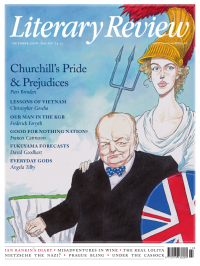Jonathan Keates
Zadok Released
Handel in London: The Making of a Genius
By Jane Glover
Macmillan 430pp £25
To succeed as an 18th-century musician you needed to be ready to travel. Not just as far as the next town or across an adjacent frontier, but for hundreds of miles along miserable roads, staying at verminous inns, a prey to bandits or drunken soldiery, between extremes of heat and cold and never quite knowing if your services, at the journey’s end, would be acceptable to the illustrious personage who had solicited them in the first place. If you got lucky, like Domenico Cimarosa or Giovanni Paisiello, popular Neapolitan opera composers from Mozart’s era who both gained appointments in St Petersburg under Catherine the Great, you returned with a full purse and an augmented reputation. Less fortunate souls never made it back again. Think of the brilliant Luigi Boccherini, who languished for decades in the country villa of a disgraced Spanish infante, or Bach’s versatile youngest son, Johann Christian, an improvident genius now mouldering in a graveyard near St Pancras Station.
The most triumphant of all such musical peregrinations provides the theme for Jane Glover’s Handel in London. Her book is not so much a biography of the composer as an exploration of the ways in which he used English audiences as a sounding board for artistic experiment, teaching them, in the process, how to listen to his music. Nobody’s fool, this adoptive Englishman was a consummate networker, resourceful, risk-taking and never relying more than he absolutely needed to on either the affluence or the influence of his various patrons.
Handel could have settled down comfortably at a German court to write cantatas and concertos in return for board and lodging. Having secured just such employment in Hanover, he immediately managed to gain twelve months’ leave and set out for London in the autumn of 1710. It was

Sign Up to our newsletter
Receive free articles, highlights from the archive, news, details of prizes, and much more.@Lit_Review
Follow Literary Review on Twitter
Twitter Feed
How to ruin a film - a short guide by @TWHodgkinson:
Thomas W Hodgkinson - There Was No Sorcerer
Thomas W Hodgkinson: There Was No Sorcerer - Box Office Poison: Hollywood’s Story in a Century of Flops by Tim Robey
literaryreview.co.uk
How to ruin a film - a short guide by @TWHodgkinson:
Thomas W Hodgkinson - There Was No Sorcerer
Thomas W Hodgkinson: There Was No Sorcerer - Box Office Poison: Hollywood’s Story in a Century of Flops by Tim Robey
literaryreview.co.uk
Give the gift that lasts all year with a subscription to Literary Review. Save up to 35% on the cover price when you visit us at https://literaryreview.co.uk/subscribe and enter the code 'XMAS24'